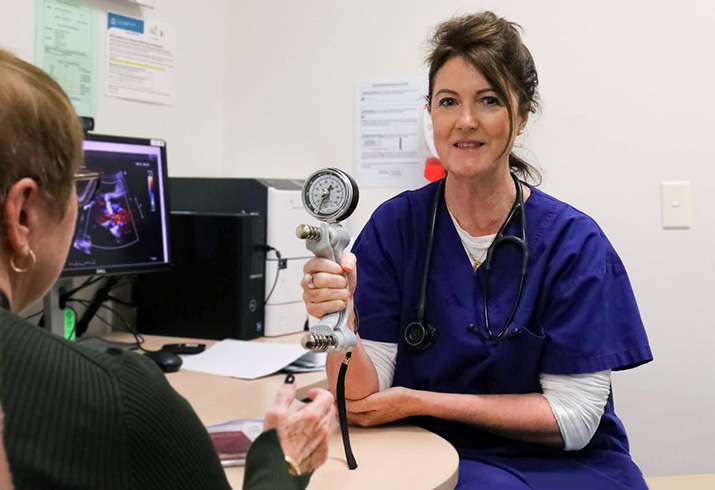Research trial to improve outcomes for older adults with heart disease
 FSH Valve Intervention Program Coordinator and Nurse Practitioner, Jen Turner, doing a frailty assessment.
FSH Valve Intervention Program Coordinator and Nurse Practitioner, Jen Turner, doing a frailty assessment.
Fiona Stanley Hospital (FSH) is hoping to improve outcomes and quality of life for older adults undergoing an intervention for heart valve disease, aortic stenosis, by participating in a research trial on integrating evidence-based frailty management guidelines into routine cardiovascular care.
At least 3 in 10 aortic stenosis patients undergoing transcatheter aortic valve implantation (TAVI) experience frailty, which is a risk factor for adverse outcomes. The ‘FRAIL-AS’ Response Trial will investigate if an evidence-based frailty response program comprising nutritional support, geriatrician assessment, cardiac rehabilitation, general practitioner engagement and patient education on frailty, can improve outcomes for older adults undergoing this type of heart intervention.
FSH is a collaborator on this cluster-randomised controlled trial conducted by the Nursing Research Institute, which will assess how effectively clinical frailty guidelines can be translated into real-world practice, measuring impacts on mortality, complications, hospital stays, recovery, and quality of life.
FSH Valve Intervention Program Coordinator and Nurse Practitioner Jen Turner is a principal investigator on the trial and said that despite the growth of transcatheter treatments for heart valve disease, dedicated frailty pathways are rarely embedded into treatment programs.
"As a nurse, I see firsthand how addressing frailty for patients with heart valve disease can change their recovery trajectory,” Jen said.
"Despite the poor outcomes it leads to, frailty is not yet systematically addressed in routine care, so this trial aims to embed frailty management as a standard part of treatment, supporting not just the heart, but the whole person”.
“The goal of the trial is to establish a new standard of care for frail patients undergoing transcatheter heart valve procedures and show that a frailty response program can be implemented across a range of hospital settings nationwide”.
“It is hoped that the trial will reduce one-year mortality, improve recovery rates, and enhance quality of life for frail patients undergoing TAVI, and if so, the findings could inform broader implementation of frailty support programs across general hospitals, community care, and telehealth, ensuring older Australians receive more holistic, person-centred care,” Jen said.
Jen is working with Dr Nicola Straiton, Senior Research Fellow at the Nursing Research Institute, who is leading the FRAIL-AS Response Trial alongside a multidisciplinary team of cardiologists, geriatricians, nurses, allied health professionals, researchers, and consumer representatives from across Australia, Canada, and the United Kingdom.
The FRAIL-AS Response Trial launched in February 2024 with recruitment and data collection continuing into 2027, followed by preliminary findings expected in early 2028. The Trial has been funded by a three-year 2023 NSW Cardiovascular Research Capacity Program grant.
Read more about the FRAIL-AS Response Trial (external site).
Keep up to date with our news and achievements
Find out more on Facebook (external site) or LinkedIn (external site)

